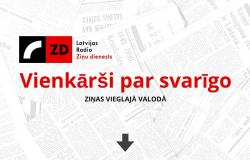
PHOTO: Scanpix/AP/LETA
Putin’s war spending will lead Russia to bankruptcy, as the country will run out of money within a year, writes express.co. If in July 2022 the National Wealth Fund of Russia had a reserve of 140 billion USD, then at the end of 2023 it decreased to 56 billion USD. To improve the ailing finances, Putin resorted to large-scale confiscation of companies and other assets owned by private individuals, passing special laws and amending existing ones for this purpose.
Healthy
8 ways to raise a child as a potential patient of a psychotherapist
TV24
This time The “boss” has made a colossal mistake. Are Russian elites actually waiting for Putin to die?
ARTICLE EDITOR
“This morning they stood there for more than half an hour, the discussions were in loud tones” – we ask the instructor which of the drivers has priority in such a situation
Read other posts
Russia expert Owen Matthews told The Spectator newspaper that at the current rate of burning $4.4 billion a month, Russia’s National Wealth Fund will run out of reserves in just over a year. Russia desperately needs money to bomb Ukrainian cities and continue its own war. Property nationalization could be a significant source of cash for the Kremlin to finance its war machine.
As the Bloomberg agency reported last year, under the influence of Putin’s pressure and sanctions, Russian businessmen have taken assets worth at least 50 billion dollars out of Europe. “Now the wealthiest citizens of Russia have fewer and fewer places to invest their wealth, as many are under US, UK or European Union sanctions,” the agency said. However, if the assets of many Russian billionaires have been frozen under the influence of EU and US sanctions, then under the influence of these or other factors, these assets may be nationalized and turned into missiles and bombs sent against Ukrainians.
At the end of January, the Russian State Duma adopted a draft law on the confiscation of property of all those convicted of discrediting the army. Now the repressive structures of Russia will be able to take off the last shirt of anyone who dares to protest against the war in Ukraine and the atrocities committed by the Russian army. However, while the authorities are still preparing to confiscate citizens’ property, the General Prosecutor’s Office has been arresting the companies of Russian businessmen for the benefit of the state for more than a year, reports Meduza.
Since the beginning of the invasion of Ukraine, the Russian authorities have increasingly threatened companies with nationalization. First, such threats were received by foreign companies that left the Russian market, then by Russian businessmen that left the country, and later by companies that were unable to fulfill state orders, that is, unable to deliver military products on time, “Meduza” writes.
In the second year of the war, Putin began to take large foreign companies under state control with his decrees. Russian businessmen also began to lose their assets, and not only those who moved abroad or were engaged in supplying the army. In Russia, separate laws are adopted and existing ones are amended to make this expropriation faster and easier for the authorities.
The most common scheme of the prosecutor’s office to confiscate the assets of Russian citizens is based on claims that during the privatization of the 1990s, companies and assets “were removed from the property of the Russian Federation against its will.” Not only large shareholders can lose their property, but also minority investors – those who bought some shares on the stock exchange.
The nationalization scheme also includes the confiscation of assets of businessmen accused of corruption or fraud. Prosecutors demand the confiscation of property that for many years openly belonged to persons against whom there were no claims until now. At least eight such claims were filed last year, including against former State Duma deputy Sergej Petrov, whose family owned one of Russia’s largest car dealers, Rolf Holding. Initially, the shares of this holding were transferred to the temporary administration of “Rosimushchestvo” in accordance with Putin’s decree signed at the end of December 2023, but five days later the General Prosecutor’s Office filed a lawsuit in court, demanding that these same shares be taken over as the property of the Russian Federation.
Another way to strip Russian private owners of assets is to declare them “foreign investors”. Namely, in 2023, the legal requirements for foreign investments were strengthened and now a Russian who has a residence permit of another country or another document that gives the right to stay permanently outside Russia can become a “foreign investor”. Due to these innovations, it will be even easier for the prosecutor’s office, courts and the Federal Antimonopoly Service to seize the assets of Russian businessmen, Meduza says.
Russia could try to use a similar scheme against Latvian citizen Pēteris Avena, whose asset value, according to “Bloomberg” estimates, is 6.31 billion US dollars. Ivans Otrakovskis, the leader of the “Army of the Defenders of the Fatherland” movement, appealed against Aven and his business partner Mikhail Fridman last year at the Russian Prosecutor General’s Office, who called for them to be investigated for articles of “treason” and “discrediting the army”, stating that they were trying to get the US and EU sanctions lifted , they have donated 150 million euros to Ukraine.
One of the first “foreign investor” lawsuits, which ended with the confiscation of the shares of the Murmansk sea fishing port, shows that the Russian Prosecutor General’s Office has all the funds. The main argument of the state in this process was the fact that the beneficiary of the port, businessman Alexander Romanov, lost his tax residence in the Russian Federation in 2020, because he stayed abroad for more than the 182 days stipulated in the Foreign Investment Law. However, due to the pandemic, the Federal Tax Service had introduced relaxations and the status of tax resident in 2020 could be maintained by staying in Russia for only 90 days instead of the standard 183 days. The businessman complied with this demand, however, the court ignored all his objections and in October 2022, the shares of the port were transferred to the state.
Themes
Tags: Putin money war confiscating property private individuals reserve fund running money
-




